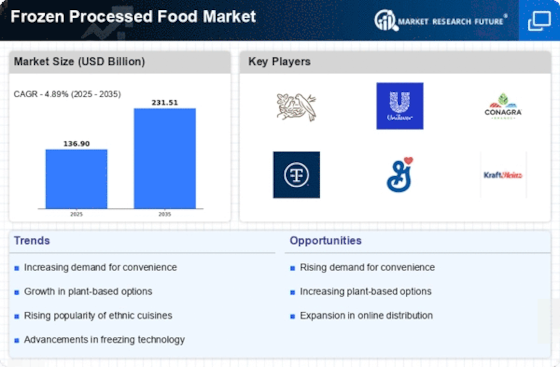Top Industry Leaders in the Frozen Processed Food Market

The Frozen Processed Food market operates within the global food industry, witnessing a dynamic competitive landscape influenced by consumer preferences for convenient and time-saving meal options. As of 2023, key players strategically position themselves in this market, employing various strategies to maintain or enhance their market share.
Strategies Adopted:Key players in the Frozen Processed Food market implement a variety of strategies to remain competitive. A significant focus is on continuous product innovation to introduce new and exciting frozen food options. Strategies also include marketing efforts to highlight the convenience and quality of frozen processed foods. Additionally, strategic collaborations and partnerships with retailers and e-commerce platforms enhance distribution channels and improve market reach. Efficient supply chain management and investments in advanced freezing technologies contribute to maintaining product quality.
Market Share Analysis:Market share analysis in the Frozen Processed Food market is influenced by several factors, including brand recognition, product quality, pricing strategies, and distribution efficiency. Companies with strong brand equity and positive consumer perceptions tend to secure a larger market share. Pricing strategies that balance affordability and perceived value are critical, considering the price sensitivity of consumers in this market. Effective distribution networks, encompassing both traditional retail channels and online platforms, play a vital role in market dominance.
New and Emerging Companies:While key players dominate the Frozen Processed Food market, new and emerging companies are entering the industry, often focusing on specific niche markets or introducing innovative frozen food options. These entrants may emphasize health-conscious ingredients, organic choices, or cater to specialized dietary requirements. Although their market share may be relatively modest compared to industry leaders, these companies contribute to the overall diversification and innovation in the Frozen Processed Food market.
Industry Trends:The Frozen Processed Food market has experienced noteworthy industry news and investment trends in 2023. Key players are increasingly investing in research and development to address evolving consumer preferences for healthier and more diverse frozen food options. Sustainability initiatives, such as eco-friendly packaging and responsibly sourced ingredients, have gained prominence. Furthermore, investments in marketing campaigns highlighting the nutritional value and convenience of frozen processed foods have become a notable trend, reflecting efforts to reshape consumer perceptions.
Competitive Scenario:The overall competitive scenario in the Frozen Processed Food market is marked by intense rivalry among key players striving to capture a larger share of the growing market. The industry's competitiveness is evident in the emphasis on innovation, sustainability, and strategic collaborations to address evolving consumer preferences. The global reach of these companies enables them to adapt to regional tastes and capitalize on emerging markets, contributing to the overall dynamism of the industry.
Recent Development:Conagra Brands: Introduced its "Simple Sides" range of frozen veggies that have been pre-seasoned with well-liked herbs and spices, providing busy families with time-saving options.In an effort to appeal to kids and young adults, Kellogg's introduced Eggo Waffles Dippers, bite-sized waffles that are ideal for dipping in syrup or fruit spreads.
Key Players:General Mills, Inc. (U.S.)Conagra Brands, Inc. (U.S.)Nestle S.A. (Switzerland)Unilever PLC (U.K.)Kellogg Company (U.S.)McCain Foods Limited (Canada)The Kraft Heinz Company (U.S.)Tyson Foods, Inc. (U.S.)Associated British Foods plc (U.K.)Ajinomoto Co., Inc. (Japan)Vandemoortele NV (Belgium)Lantmannen Unibake International (Denmark)Cargill, Incorporated (U.S.)Europastry, S.A. (Spain)JBS S.A. (Brazil)ARYZTA AG (Switzerland) and Nomad Foods Limited (U.K.)











